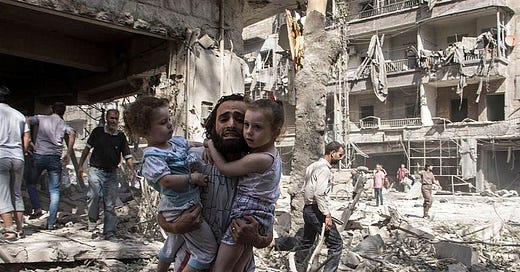The Long Road to Damascus
A few months ago, the ongoing Syrian civil war washed over our nation, inundating our airwaves, print media, and the general punditry. By now, the Syria story has matured through the typical stages, coming to rest on the main stage of the UN where the issue may or may not stall. Either way, Syria and its troubles seem fated to fade from American interest for the immediate future. In its place, new vivid images of terrorism came to us from Kenya. We quickly began talking about al-Shabab, the resurgence of al-Qaeda, the failed state of Somalia, and intervention.
In the midst of this wave, one fact really stuck out to me: eight out of ten Americans believe that al-Assad’s regime gassed its own people while seven out of ten Americans believe that it is not in the country’s interest to intervene.
This means a good chunk of the American people are willing to do nothing, or think nothing can be done, as the Syrians’ lives are obliterated by the heartless exigencies of war and culled by a cold-blooded government that doesn’t bat an eye at gassing its citizens. That’s a fair position to hold. It just makes me think twice about whether it’s generally well-reasoned.
Philosophers can call it altruism or maximizing utility and evolutionary biologists can say that it’s simply kin selection or that we do it for the dopamine. But I think the point is that to be compassionate is to be human. We cringe when we see others in pain. If we can, we try to help. So what keeps us, a democratic political, economic, and military superpower from doing just that?
There are a number of very good reasons. The geopolitical situation is more complicated than an isolated humanitarian crisis. Intervention in Syria would send dangerous reverberations through a web that at the very least connects Iran, Israel, Saudi Arabia, Russia and China. Iraq and Afghanistan have painfully highlighted for us the importance of clarity in strategy and despite our military strength, the situation in Syria doesn’t lend itself to clear, reasonable objectives that can be accomplished effectively. All in all, the calculus may very well weigh heavily towards non-intervention.
With all that, it’s no wonder that we’ve become jaded. These stories come to us like perfectly inured pieces of seaglass washed up on the beach. We pick it up, it holds our gaze for a while, and then we toss it back into the ocean. Ubiquity and powerlessness breed apathy. So no matter how brilliantly we analyze these humanitarian crises (aka human suffering), they seem to leave us in the end with an impression that is profoundly dull.
Is there a better way to do it? I’m not sure. But if there is, I think it starts with going back to the question of compassion. The cost-benefit analysis may say no to intervention. But we do others and ourselves a disservice by not properly weighing the other side of the calculation. And what’s on that side isn’t just IR theory, or geopolitics, or national security. It’s empathy for other people, their joys and their sufferings. Just like the right way to do math or science is by thinking, the proper way to evaluate pure suffering is through feeling. Sure, feeling doesn’t make up all of the decision but it must make up some of it.
In the end, if we truly want to make the right decision, we should recognize what we’re dealing with. We shouldn’t abstract it away. We shouldn’t learn apathy and helplessness because we’ve seen this before and we know we can’t do anything. We shouldn’t assume that just because something is subjective it doesn’t hold weight against loftier considerations. If we want to do right by us and by others, we urgently need to understand what’s going on in Aleppo, or Nairobi, or Newtown. And if we decide not to intervene — fine, so be it. But we should choose remembering that a parent is watching his children die as they asphyxiate from sarin gas. That a child is growing up, having seen his home bombed, his sister blinded by shrapnel, his father emasculated by a soldier who could not care less about threatening his family’s life, and a whole assortment of capital-H, Horrors that simply cannot be expressed by a comma-separated list. We should choose to think about these things, as much as we can handle it, because the proper response to Syria or Kenya isn’t a sigh but something more like a silent roar of indignation and outrage. You can’t solve a problem without being aware of it, in all its punishing totality.
Stalin once said that one death is a tragedy but a million deaths are a statistic.
But I don’t take my cues from Stalin. Neither should you.




